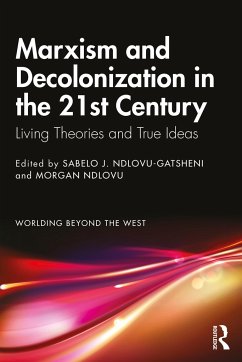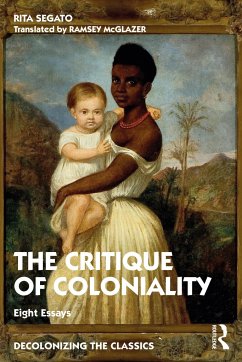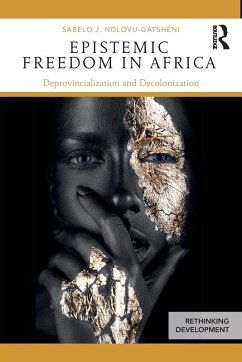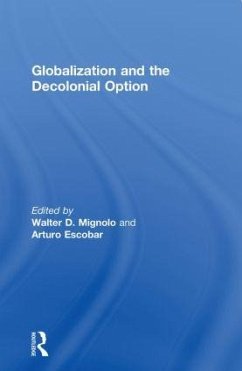
Decolonization, Development and Knowledge in Africa
Turning Over a New Leaf
Versandkostenfrei!
Versandfertig in 6-10 Tagen
128,99 €
inkl. MwSt.
Weitere Ausgaben:

PAYBACK Punkte
64 °P sammeln!
This provocative book is anchored on the insurgent and resurgent spirit of decolonization of the twenty-first century. The author calls upon Africa to turn over a new leaf in the domains of politics, economy, and knowledge as it frees itself from imperial global designs and global coloniality.With a focus on Africa and its Diaspora, the author calls for a radical turning over of a new leaf, predicated on decolonial turn and epistemic freedom. The key themes subjected to decolonial analysis include: (1) decolonization/decoloniality - articulating the meaning and contribution of the decolonial t...
This provocative book is anchored on the insurgent and resurgent spirit of decolonization of the twenty-first century. The author calls upon Africa to turn over a new leaf in the domains of politics, economy, and knowledge as it frees itself from imperial global designs and global coloniality.
With a focus on Africa and its Diaspora, the author calls for a radical turning over of a new leaf, predicated on decolonial turn and epistemic freedom. The key themes subjected to decolonial analysis include: (1) decolonization/decoloniality - articulating the meaning and contribution of the decolonial turn; (2) subjectivity/identity - examining the problem of Blackness (identity) as external and internal invention; (3) the Bandung spirit of decolonization as an embodiment of resistance and possibilities, development and self-improvement; (4) development and self-improvement - of African political economy, as entangled in the colonial matrix of power, and the African Renaissance, as weakened by undecolonized political and economic thought; and (5) knowledge - the role of African humanities in the struggle for epistemic freedom.
This groundbreaking volume opens the intellectual canvas on the challenges and possibilities of African futures. It will be of great interest to students and scholars of Politics and International Relations, Development, Sociology, African Studies, Black Studies, Education, History Postcolonial Studies, and the emerging field of Decolonial Studies.
With a focus on Africa and its Diaspora, the author calls for a radical turning over of a new leaf, predicated on decolonial turn and epistemic freedom. The key themes subjected to decolonial analysis include: (1) decolonization/decoloniality - articulating the meaning and contribution of the decolonial turn; (2) subjectivity/identity - examining the problem of Blackness (identity) as external and internal invention; (3) the Bandung spirit of decolonization as an embodiment of resistance and possibilities, development and self-improvement; (4) development and self-improvement - of African political economy, as entangled in the colonial matrix of power, and the African Renaissance, as weakened by undecolonized political and economic thought; and (5) knowledge - the role of African humanities in the struggle for epistemic freedom.
This groundbreaking volume opens the intellectual canvas on the challenges and possibilities of African futures. It will be of great interest to students and scholars of Politics and International Relations, Development, Sociology, African Studies, Black Studies, Education, History Postcolonial Studies, and the emerging field of Decolonial Studies.














